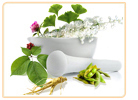Natural Herbal Remedies For Menopause
 This page is aimed at answering any questions concerned with the perceived benefits/side effects of using natural herbal remedies to relieve the symptoms of menopause. In doing so it will also provide a broad explanation of menopause�s causes, stages and symptoms to demonstrate how different types of herbs (phytosetrogenic and non-estrogenic) can effectively alleviate menopause symptoms. Read the following information in order to discover the best natural herbal remedies for menopause.
This page is aimed at answering any questions concerned with the perceived benefits/side effects of using natural herbal remedies to relieve the symptoms of menopause. In doing so it will also provide a broad explanation of menopause�s causes, stages and symptoms to demonstrate how different types of herbs (phytosetrogenic and non-estrogenic) can effectively alleviate menopause symptoms. Read the following information in order to discover the best natural herbal remedies for menopause.
What is menopause?
To reduce the symptoms of menopause, doctors generally prescribe estrogen. However, there are risks as estrogen may worsen asthma, cause heart disorders, kidney stones, epilepsy or migraines. For this reason many women seek alternatives in the form of herbal supplements.
Menopause is the final menstrual period in a woman�s life. It symbolizes the end of her reproductive years in a similar way that the first menstrual period, beginning at puberty, marks the start. As women begin to approach menopause, the production of hormones such as estrogen in the ovaries starts to slow down, eventually to a pace where menstruation ceases altogether.
Because of the change in hormonal levels women in over 70% of cases will suffer from a variety of symptoms associated with menopause. Some of the most common symptoms of menopause include hot flashes and night sweats, aches and pains, forgetfulness and depression.
Types of natural herbal remedies for menopause
There are two key natural herbal remedies used in combating menopause symptoms; phytoestrogenic herbs and non-estrogenic herbal supplements. The first group contains phytohormones (compounds similar to the body�s hormones), while the second group simply stimulates the body�s own hormonal production.
Phytoestrogenic herbs
 Phytoestrogenic herbal remedies for menopause are plants containing herbal components called phytoestrogens, which have chemical structures similar to human estrogen.
Phytoestrogenic herbal remedies for menopause are plants containing herbal components called phytoestrogens, which have chemical structures similar to human estrogen.
Phytoestrogenic herbs can help people who are suffering from hormone related ailments, because they mimic the body�s own source of the estrogen hormone. Although phytoestrogens are found in all plants they commonly only appear in large doses in herbs such as black cohosh, ginseng, soy, red clover and dong quai.
Non estrogenic herbs
As the name suggests, non-estrogenic herbs do not contain any sort of chemical structure similar to estrogen. While there are many varieties of non-estrogenic plants, only a very few non-estrogenic herbs have the nutrients that can stimulate the body into producing and balancing hormonal levels. Sadly, even fewer non-estrogenic herbs have been the subject of serious studies that can confirm these claims.
Maca Root
The maca root has been used for centuries in South America. Both the indigenous peoples of South America and the Spanish have used the maca root for centuries. The maca root, when combined with food, was originally thought to be an aphrodisiac. People still eat it today for its sexual benefits. The maca root, which resembles a radish, is also a great supplement for reducing the frequency and intensity of menopausal symptoms.
What herbal supplement for menopause should I use?
Given the amount of people looking for new ways to improve their overall health, it is hardly surprising that they are turning to natural remedies rather than pharmaceutical drugs more and more. This is the reason why herbal supplements are gaining in popularity.
Much of the research on the therapeutic applications of various herbs and herbal extracts presents strong evidence that taking herbal supplements in conjunction with a healthy diet and lifestyle can be beneficial. Therefore, many people use natural herbal remedies to treat various health problems as well as to promote general well-being.



























